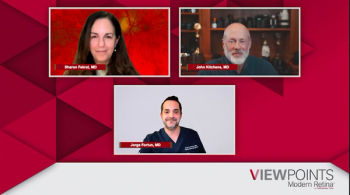
OSN New York Retina 2024: Understanding how next-generation anti-VEGFs perform in real-world settings compared to trials
Ferhina S. Ali, MD, discussed the real-world efficacy and durability of next-generation anti-VEGF agents like faricimab and aflibercept 8 mg, emphasizing how large-scale data offers insights into their performance and safety beyond clinical trials.
Ferhina S. Ali, MD, MPH, presenting at the OSN New York Retina meeting, discussed advances in next-generation anti-VEGF therapies, focusing on real-world data compared with clinical trial outcomes. She highlighted how new agents like faricimab (tested in the TENAYA, LUCERNE, YOSEMITE, and RHINE trials) and aflibercept 8 mg (studied in PULSAR and PHOTON) address the need for extended treatment durability. Although aflibercept 8 mg was only recently approved, growing real-world data supports faricimab’s efficacy and safety, with notable improvements in vision and anatomical outcomes, she noted.
In this interview with Modern Retina, Ali highlights how key clinical trials, such as the FARETINA (using the IRIS Registry) and VOYAGER studies, reinforce faricimab’s real-world performance, including similar injection frequencies and favorable anatomical results in AMD and DME patients. The TRUCKEE and TAHOE studies also support its efficacy, and a multicenter study revealed improved treatment intervals when switching to faricimab from other anti-VEGF agents.
Ali discussed real-world challenges affecting treatment outcomes, such as payer policies, scheduling issues, and patient comorbidities, which contrast with clinical trial settings. Real-world data offers insights into usage patterns and safety signals across broader patient demographics than trials, aided by databases like the IRIS Registry and Vestrum. This data informs clinicians about potential side effects that may be rare or absent in trials but emerge with large-scale use. Overall, real-world data is pivotal in refining treatment practices, helping address clinical needs that trials may not fully capture.
Ali looks forward to further discussions at the meeting, emphasizing the value of real-world insights for advancing anti-VEGF therapies.
Newsletter
Keep your retina practice on the forefront—subscribe for expert analysis and emerging trends in retinal disease management.






































